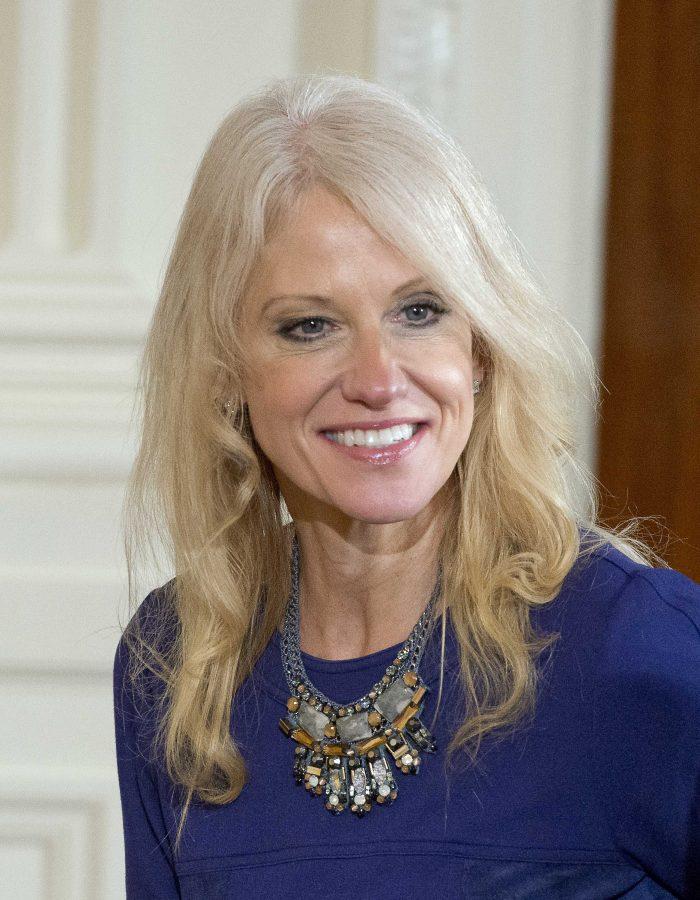Conway’s ban from MSNBC signifies growing Trump-media disconnect
Kellyanne Conway arrives for a joint press conference with U.S. President Donald J. Trump and Canadian Prime Minister Justin Trudeau on Feb. 13, 2017 in the East Room of the White House in Washington, D.C.
Feb 22, 2017
 Kellyanne Conway, senior counselor and presidential spokesperson for the Donald Trump administration, was banned last week from appearing on the MSNBC show “Morning Joe.”
Kellyanne Conway, senior counselor and presidential spokesperson for the Donald Trump administration, was banned last week from appearing on the MSNBC show “Morning Joe.”
Mika Brzezinski, co-host for the show, explained that Conway was not credible. Joe Scarborough argued that Conway was uninformed regarding the White House’s events and that Conway’s falsehoods would mislead viewers.
Conway has been heavily criticized for her mentioning of the mythical “Bowling Green Massacre,” along with statements that contradicted the White House regarding Michael Flynn’s resignation and her endorsement of Ivanka Trump’s clothing line on Fox News.
This stunning, unprecedented move of a major television program refusing to speak to a prominent member of the presidential administration, even after she requested multiple times to be booked for the show, is reflective of the widening distance between the government and the people it is supposed to represent.
The Trump administration has made definitively clear, even from the beginning, the distrust that it holds for the media. The media has historically acted as one of the main bridges of communication between the people and the government, informing the public of the events happening in Washington and information they would not be able to get ahold of otherwise.
Get The Daily Illini in your inbox!
However, press secretary Sean Spicer and Conway supplied the press with incorrect or purposefully misleading information, essentially creating a propaganda-esque image of the government’s current situation.
Spicer declared that the crowds were the largest at any presidential inauguration, which was quickly debunked. He’s since given inaccurate or vague information about the immigration ban, Flynn and the day-to-day activities at the White House. Conway even presented the idea of “alternative facts” in an interview on NBC, revealing the warped perception they are presenting to the public.
This misrepresentation has not gone unnoticed by the media and the people. Rather, it has built up a level of distrust and alienation that has brought on the decision to altogether ban uncredible government representatives to prevent the spread of these lies to a mass public.
The growing distance between our government and its people is dangerous. The government becomes ignorant of the needs and grievances of the people, while the people are unaware of the activities of the government, including any possible corruption or questionable decisions.
President Trump has already begun to ignore hard-hitting questions from veteran reporters in order to avoid addressing topics that the public was generally concerned about. Rather, Trump hunted around for “friendly reporters” who would pose questions that would only depict him in a positive light.
Trump has even referred to media as the “enemy of the American people.” Trump is dedicated to focusing on his plan without listening to and understanding his main mode of communication from the public.
In addition, the people have no way of knowing the daily dealings at the White House with a growing divide between media and government. This became only more pertinent with the resignation of Flynn, the former national security adviser who discussed sanctions with a Russian ambassador even before Trump’s inauguration, which was troubling due to the Russian infiltration and meddling during the presidential election.
With such a shocking situation exposed to the public, it’s troubling to consider the amount of corruption that could pass by unnoticed without the amount of scrutiny that is currently imposed by the media.
While Conway’s ban from MSNBC may appear to be an isolated event brought upon by her own decisions, it is related to a broader situation of distrust and wariness present in the relationship between the government and its people.
This separation must be eliminated in order to prevent corruption and misrepresentation from running rampant in our country.
Minju is a sophomore in Media.






